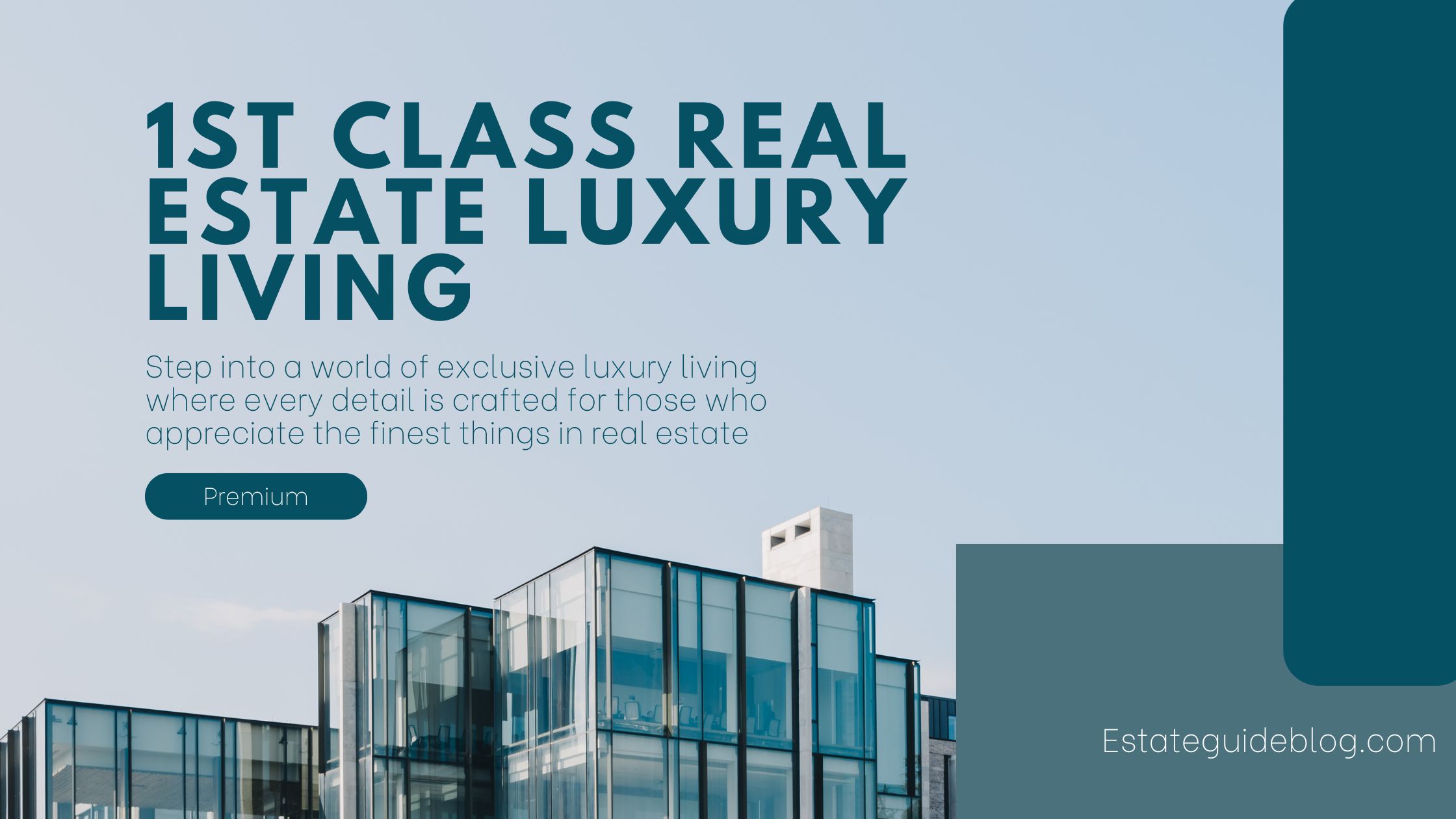Live in Style: 1st Class Real Estate Luxury Living
Explore 1st class real estate for luxury living in 2025. Discover elite properties, amenities, and market trends for high-end buyers and investors.

Admin
June 23, 2025

Introduction: The Rise of 1st Class Luxury Living
In 2025, luxury living has evolved far beyond granite countertops and a good zip code. “1st class real estate” now signals a comprehensive lifestyle merging state-of-the-art technology, global connectivity, sustainability, and elevated aesthetics. Whether you’re a seasoned investor or a discerning homeowner, understanding what qualifies as first-class real estate today is essential for making smart, future-proof decisions.
Advertisement
In-Content Ad
Blog Detail - After Two Paragraphs
High Engagement Zone
What Makes Real Estate ‘First Class’ in 2025?
Luxury homes of the past may have dazzled with chandeliers and designer kitchens. Today, true 1st class real estate delivers far more. It integrates:
Smart Home Infrastructure: AI learns your habits to adjust lighting, temperature, and security.
Sustainability: Green roofs, water recycling systems, and carbon-neutral construction practices.
Privacy & Security: Facial recognition gates, drone surveillance, and biometric vaults.
Location Prestige: Not just the city but the street. Proximity to elite schools, embassies, and private airports adds exponential value.
2025 Global Market Trends in Ultra-Luxury Living
Luxury real estate is surging globally, but some markets are heating faster than others:
North America
Cities like Miami and Austin are drawing international buyers due to tax benefits and lifestyle appeal. Manhattan’s luxury co-ops are making a comeback after post-pandemic price dips.
Europe
Lisbon, Marbella, and Monaco offer privacy and EU residency pathways. London’s Mayfair and Chelsea remain strongholds despite Brexit-related volatility.
Middle East & Asia
Dubai is the undisputed luxury leader in the Middle East, while Singapore continues to dominate Asia with its stable government and financial hub status.
Who’s Buying? The New Face of Luxury Real Estate Buyers
The modern luxury buyer is younger, more mobile, and digitally native. In 2025:
48% of buyers are under 45, per a Coldwell Banker Global Luxury report.
Many are entrepreneurs, influencers, or crypto investors.
There’s a growing demand for multi-functional homes combining personal wellness, business space, and family life under one high-tech roof.
The Business Case for Buying 1st Class Real Estate
For investors, luxury real estate isn't just about prestige. It's a strategic financial move.
Tax Efficiency: Many jurisdictions offer reduced property taxes or no capital gains.
Portfolio Diversification: Real estate provides a tangible hedge in volatile markets.
Appreciation & Rental ROI: Ultra-luxury short-term rentals are fetching up to $20,000/week in prime zones like Ibiza, Aspen, and Amalfi Coast.
Key Features Buyers Should Demand in 2025
The 2025 first-class buyer should expect:
Voice-activated everything
Wellness rooms with circadian lighting
Noise-cancellation architecture
Integrated EV garages with solar charging
Air purification and hydrotherapy spas
Properties not offering these may struggle to compete in this high-tier market.
Expert Advice When Buying Luxury Real Estate
Work with agents who:
Advertisement
Mid-Article Ad
Blog Detail - Middle of Content
Maximum Visibility
Specialize in ultra-luxury deals (>$5M)
Offer access to off-market listings
Understand international taxation and legal frameworks
Have personal networks with developers and private banks
Due diligence should include title research, property history, smart tech audits, and zoning compliance.
FAQs
1. What defines 1st class real estate in 2025?
First-class real estate refers to ultra-premium properties located in prime global markets offering luxury finishes, state-of-the-art smart home technology, privacy, and high investment potential. These homes often include amenities like private spas, in home theaters, wellness centers, and concierge services. In 2025, “first class” also includes sustainability features like solar integration and AI-powered energy efficiency. It’s more than aesthetics it’s about lifestyle, prestige, and enduring value.
2. Where are the top locations for 1st class luxury living?
Prime locations for 1st class real estate in 2025 include Manhattan, Beverly Hills, Dubai Marina, Central London, and The Hamptons. Emerging markets like Singapore’s Orchard Road, Istanbul’s Bosphorus-side mansions, and beachfront developments in Portugal and Thailand are also drawing elite buyers. The key drivers are exclusivity, access to global commerce, and cultural relevance.
3. What amenities are expected in luxury real estate today?
Buyers in 2025 expect high-end amenities such as wellness-focused architecture, smart glass windows, biometric security, infinity pools, wine cellars, and AI-integrated appliances. Properties often come with 24/7 concierge, private chef services, and access to curated experiences like private jets or yachts. “Luxury” has become synonymous with personalization, health, and hyper-convenience.
4. Is investing in 1st class real estate still profitable in 2025?
Yes, ultra-luxury properties remain a strong hedge against inflation and economic uncertainty. According to Knight Frank’s Wealth Report, luxury real estate appreciated by 5.7% globally in Q1 2025. Cities like Dubai and Miami saw double-digit growth due to high foreign investment and tax benefits. These properties offer long-term ROI, rental income, and capital appreciation potential.
5. How much does a 1st class luxury property cost in 2025?
Prices vary drastically by region. As of mid-2025, expect to pay:
$4M–$10M in Los Angeles
$2M–$8M in Miami
$6M–$20M in New York
€3M–€10M in Monaco or the French Riviera
Custom-designed penthouses or waterfront villas can exceed $50M. Property taxes, HOA fees, and luxury upkeep should also be factored in.
6. Who typically buys 1st class luxury homes?
High-net-worth individuals (HNWIs), celebrities, tech entrepreneurs, hedge fund managers, and international elites dominate this market. Increasingly, crypto millionaires and digital nomads are also entering the luxury segment. Buyers look for prestige, exclusivity, and often use these homes as both lifestyle assets and long-term investments.
7. How do luxury real estate agents provide added value?
Top agents act as private advisors, not just salespeople. They offer off-market access, negotiate high-stakes deals, vet documentation thoroughly, and manage complex legalities in cross-border transactions. Many also connect clients with architects, interior designers, and global wealth managers. In 2025, agents are expected to provide complete lifestyle solutions not just listings.
8. What trends are shaping luxury living in 2025?
Major trends include AI-powered smart homes, sustainable construction, wellness-centric layouts, and experiential amenities. Biophilic design, tech-augmented reality (for virtual staging), and eco-conscious smart communities are in high demand. Privacy-first estates with climate resilience and drone security systems are also growing in popularity.
9. Can foreign investors buy luxury real estate in the U.S. or Europe?
Yes, foreign nationals can invest in the U.S., U.K., and EU luxury markets. In the U.S., there’s no citizenship requirement for property ownership, though financing and taxation laws vary by state. Portugal and Greece remain top choices in Europe due to favorable golden visa programs. Legal guidance is essential for navigating local laws, title ownership, and taxation.
10. How does luxury property appreciation compare to standard real estate?
Luxury properties tend to perform better during economic upswings and hold value more firmly during downturns. While they’re more illiquid, the scarcity factor (especially in prime zones) boosts their long-term appreciation. A 2025 Sotheby’s study shows luxury markets outpacing traditional real estate by 2.5% annually over the last five years, particularly in trophy asset categories.
Conclusion: Is 1st Class Real Estate Right for You?
In 2025, owning 1st class real estate isn’t just about showing success it’s about securing future-forward luxury, convenience, and legacy. Whether you're investing or living in it, choosing a first-class property is a step toward a better life and a smarter future.
Advertisement
Before Last 2 Tags
Blog Detail - Before Last 2 Tags in Description
Final Engagement Point

About Admin
Related Articles

Best Bag for Real Estate Agent 2025
Real estate agents need bags that blend style, function, and comfort. Discover the 2025 picks that keep you organized and professional all day.

Admin
Aug 26, 2025

Can You Lose Your Real Estate License? Expert Guide
Discover the real reasons agents lose real estate licenses. Avoid costly mistakes with expert insights and real-world examples.

Admin
Aug 19, 2025

506(b) Real Estate: SEC Rules & Benefits Explained
Learn what 506(b) real estate means, its SEC rules, benefits, and investor requirements in this expert guide for 2025 property syndications.

Admin
Aug 15, 2025